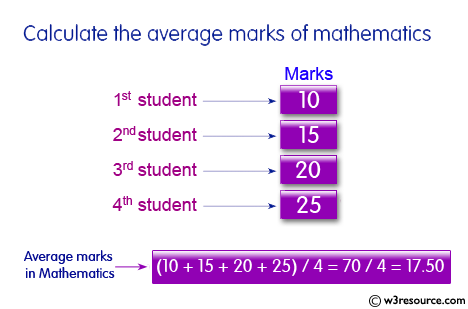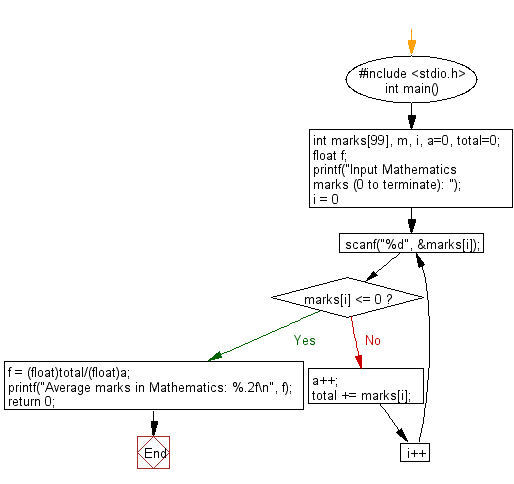C Exercises: Calculate the average marks of mathematics of some students
C Basic Declarations and Expressions: Exercise-44 with Solution
Write a C program to calculate the average marks of mathematics of some students. Input 0 (excluding to calculate the average) or negative value to terminate the input process.
Pictorial Presentation:

Sample Solution:
C Code:
#include <stdio.h>
int main()
{
int marks[99], m, i, a=0, total=0;
float f;
printf("Input Mathematics marks (0 to terminate): ");
for(i = 0; ; i++)
{
scanf("%d", &marks[i]);
if(marks[i] <= 0) {
break;
}
a++;
total += marks[i];
}
f = (float)total/(float)a;
printf("Average marks in Mathematics: %.2f\n", f);
return 0;
}
Sample Output:
Input Mathematics marks (0 to terminate): 10 15 20 25 0 Average marks in Mathematics: 17.50
Flowchart:

C programming Code Editor:
Contribute your code and comments through Disqus.
Previous: Write a C program that reads two integers p and q, print p number of lines in a sequence of 1 to b in a line.
Next: Write a C program to calculate the value of S where S = 1 + 1/2 + 1/3 + … + 1/50.
What is the difficulty level of this exercise?
Test your Programming skills with w3resource's quiz.
C Programming: Tips of the Day
Static variable inside of a function in C
The scope of variable is where the variable name can be seen. Here, x is visible only inside function foo().
The lifetime of a variable is the period over which it exists. If x were defined without the keyword static, the lifetime would be from the entry into foo() to the return from foo(); so it would be re-initialized to 5 on every call.
The keyword static acts to extend the lifetime of a variable to the lifetime of the programme; e.g. initialization occurs once and once only and then the variable retains its value - whatever it has come to be - over all future calls to foo().
Ref : https://bit.ly/3fOq7XP
- New Content published on w3resource:
- HTML-CSS Practical: Exercises, Practice, Solution
- Java Regular Expression: Exercises, Practice, Solution
- Scala Programming Exercises, Practice, Solution
- Python Itertools exercises
- Python Numpy exercises
- Python GeoPy Package exercises
- Python Pandas exercises
- Python nltk exercises
- Python BeautifulSoup exercises
- Form Template
- Composer - PHP Package Manager
- PHPUnit - PHP Testing
- Laravel - PHP Framework
- Angular - JavaScript Framework
- Vue - JavaScript Framework
- Jest - JavaScript Testing Framework
